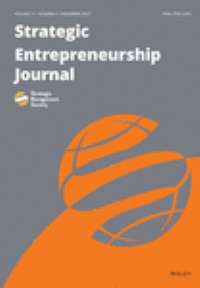社会保险与创业:失业救济金对新企业形成的影响
IF 5.4
2区 管理学
Q1 BUSINESS
引用次数: 5
摘要
研究综述本文研究了社会保险对失业人员创业决策的影响。利用美国各州福利慷慨程度随时间的交错变化,我发现更高的失业保险福利既降低了失业者成为自营职业者的概率,也延长了他们过渡之前的时间。UI利益的负面影响集中在非法人企业的形成上。以利润和生存率衡量,失业者在福利较高的国家时期创建的非法人企业往往更成功,这表明福利较高的企业主要屏蔽了生产率较低的企业的进入。在非割让期和提供自营职业援助计划的州,负面影响较小。管理摘要在新冠肺炎大流行期间,最初失业的新企业家比例达到25年来的最高水平(30%)。本文研究了影响失业人员创业决策的因素。我的实证结果表明,较高的失业保险福利阻止了失业者组建非法人企业,而那些进入市场的人比福利较低的州的其他人表现更好。这些结果表明,由于业务利润必须从UI福利中扣除,较高的UI福利主要筛选出质量较低的业务。在没有自营职业援助(SEA)计划的州和经济衰退期间,抑制作用更大,这表明需要像SEA计划这样的广泛政策,尤其是在经济衰退期间。本文章由计算机程序翻译,如有差异,请以英文原文为准。
Social Insurance and Entrepreneurship: The Effect of Unemployment Benefits on
New‐Business
Formation
Research Summary This article studies the impacts of social insurance on the decisions of unemployed individuals to start businesses. Exploiting staggered changes in benefit generosity across U.S. states and over time, I find that higher unemployment insurance (UI) benefits both lower the probability that an unemployed person will become self-employed, and also extend the length of time that passes before they make such a transition. The negative effects of UI benefits are concentrated on the formation of unincorporated businesses. Unincorporated businesses created by unemployed people in higher-benefit state-periods tend to be more successful, as measured by profit and survival rate, suggesting that higher benefits mainly screen out the entry of less productive firms. The negative effects are smaller during nonrecession periods and in states that offer a Self-Employment Assistance program. Managerial Summary During the COVID-19 pandemic, the share of new entrepreneurs who were initially unemployed reached the highest level (30%) recorded in 25 years. This article studies factors that impact the decision of unemployed people to start businesses. My empirical results show that higher unemployment insurance (UI) benefits deter unemployed people from forming unincorporated businesses, while those that do enter the marketplace perform better than others located in lower-benefit state-periods. These results suggest that higher UI benefits mainly screen out lower-quality businesses due to the requirement that business profits have to be deducted from UI benefits. The disincentive effects are larger in states without Self-Employment Assistance (SEA) program and during recessions, suggesting the need for widespread policies like the SEA program, especially during economic downturns.
求助全文
通过发布文献求助,成功后即可免费获取论文全文。
去求助
来源期刊

Strategic Entrepreneurship Journal
Multiple-
CiteScore
11.10
自引率
1.60%
发文量
31
期刊介绍:
The Strategic Entrepreneurship Journal is a research journal that publishes original work recommended by a developmental, double-blind review process conducted by peer scholars. Strategic entrepreneurship involves innovation and subsequent changes which add value to society and which change societal life in ways which have significant, sustainable, and durable consequences. The SEJ is international in scope and acknowledges theory- and evidence-based research conducted and/or applied in all regions of the world. It is devoted to content and quality standards based on scientific method, relevant theory, tested or testable propositions, and appropriate data and evidence, all replicable by others, and all representing original contributions. The SEJ values contributions which lead to improved practice of managing organizations as they deal with the entrepreneurial process involving imagination, insight, invention, and innovation and the inevitable changes and transformations that result and benefit society.
 求助内容:
求助内容: 应助结果提醒方式:
应助结果提醒方式:


